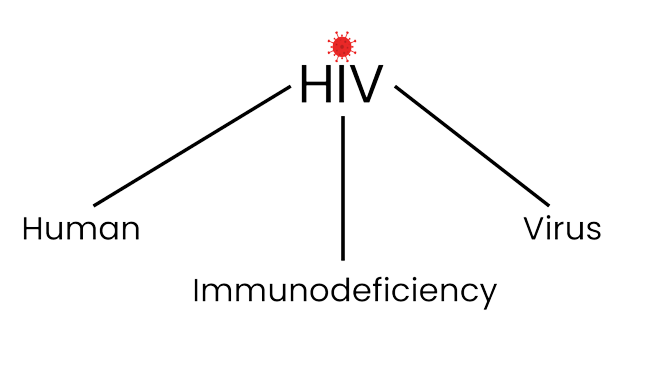What is HIV?

HIV stands for Human Immunodeficiency Virus, in other words:
Human virus that breaks down the immune system. It is a virus that decreases the number of white blood cells by infecting the cells of the human immune system. This results in a weakened immune system and makes it harder to fight off germs and common illnesses. Infections will also last longer, are more severe, and might come back more often.

When people with HIV don't get treatment, they typically progress through 3 stages:

This stage generally develops within 2-4 weeks after infection with HIV.
In the acute stage of infection, HIV multiplies rapidly and spreads throughout the body. The level of HIV in the blood is also very high, which greatly increases the risk of HIV transmission.
-
Possible symptoms:
- Fever
- Headache
- Rash
- Chills
- Night sweats
- Muscle aches
- Sore throat
- Fatigue
- Swollen lymph nodes
- Mouth ulcers

This is the stage where HIV continues to multiply in the body but at very low levels and is also called asymptomatic HIV infection or clinical latency.
Without antiretroviral therapy (ART), chronic HIV infection usually advances to AIDS in about 10 years, but people who are taking ART may be in this second stage for several decades. While it is still possible to transmit HIV, people who take ART exactly as prescribed have a significant lower risk of transmitting HIV through sex.
-
Possible symptoms:
- Swollen lymph glands
- Skin rashes
- Oral sores
- Fatigue

AIDS stands for Acquired Immunodeficiency Syndrome and is the last and most severe stage of HIV infection. In this stage the immune system is so weakened that it can no longer defend you and life-threatening infections or cancers can occur. Once a person is diagnosed with AIDS, they can transmit HIV to others very easily. Without treatment, people with AIDS typically survive about 3 years.
-
Possible symptoms:
- Rapid weight loss
- Recurring fever or profuse night sweats
- Extreme and unexplained tiredness
- Prolonged swelling of the lymph glands in the armpits, groin or neck
- Diarrhea that lasts more than a week
- Sores of the mouth, anus or genitals
- Pneumonia
- Red, brown, pink or purplish blotches on or under the skin or inside the mouth, nose or eyelids
- Memory loss, depression and other neurological disorders
Causes of HIV
HIV can be transmitted if bodily fluids such as infected blood, semen and pre-cum, vaginal fluids and breast milk, come in contact with a person's mucous membrane or bloodstream.
- This means that you can contract HIV in the following situations:
- By having oral, anal or vaginal sex.
- Sharing drug needles and syringes contaminated with HIV puts you at high risk of getting infected.
- From blood transfusions.
- During pregnancy or delivery or through breast-feeding.
Effects of HIV
Your immune system has many types of white blood cells that fight infections. HIV gets inside a kind called CD4 cells and makes copies of itself. The virus kills the cell, and the new viruses go off to find more.
Your body responds by making more CD4 cells, but after a while it can't keep up with the virus. This makes your immune system weak, which makes you more likely to get sick, even from common germs. Infections also last longer, are more severe, and might come back more often.
- Some common ones are:
- Candidiasis
- Pneumocystis pneumonie (PCP)
- Mycobacterium avium complex (MAC)
- Cytomegalovirus
- Kaposi's sarcoma
- Lymphoma
- Tuberculosis
- Salmonella septicemia
Preventions
HIV can become a serious problem but luckily there are many ways to prevent the spreading of HIV such as:
-
Sexual activities
You can start by choosing less risky sexual activities that dont include coming into contact with HIV transmitting body fluids such as oral sex, instead of anal or vaginal sex, since there is no risk of getting HIV through oral sex. Make sure that when using condoms to protect yourself and others you wear it the right way.
InjectionsIt isn't recommended to inject drugs, but if you do, only use new, clean and sterile injection equipment and water and never share your equipment with others.
PrepIf you haven't gotten HIV but you are at risk, you can start by using prep medication prescribed by your doctor. Prep is highly effective at reducing the risk of getting HIV through sex or drug injections.
Mother-to-child transmissionHIV can be transmitted from a mother to her child during pregnancy, childbirth and breastfeeding. Before you decide to get pregnant you and your partner can both get tested for HIV. You can also consider getting medications from your doctor such as prep to protect you and your baby from getting HIV
PEPPEP is a medication that should be used only in emergency situations and must be started within 72 hours after a recent possible exposure to HIV. If you're prescribed PEP, you'll need to take it daily for 28 days.
Get tested for HIVTesting is important because it is the only way to know if you have HIV. The sooner that HIV is detected, the sooner medical care can begin. Getting early HIV treatment will help keep you healthy and prevent HIV from affecting how long you live or how well you feel.
History

In 1981, the world was met with a new deadly disease. Gay men especially showed a variety of infections and were so weakened that they eventually died. Because of this everyone thought it was a sexually transmitted disease amongst gay men and named the disease GRID, Gay Related Immune Disease.


It was later discovered that the disease also affected injecting drug users, people who had received donated blood and heterosexuals. In Africa, the epidemic was already much bigger and the disease was given the name AIDS. In 1983 the virus that causes AIDS was found and was called HIV.

Statistics in Suriname
We received the information of the statistics from a HIV focal point in Suriname, Monique Holtuin. It has been estimated that 1% of the adult population in Suriname is living with HIV.
In which group does it occur more often and why?
In certain vulnerable groups the percentage is higher than in others. The percentages are higher in cases where men have sex with other men, in cases of male sexworkers and transgender females. And in the cases about men, more than in women, because men are discovered later and because they have a different health seeking behavior than women. Men go for tests later, while women are obliged to go to the doctor, often because they are pregnant, they are not so much going for their health. Even if they aren't pregnant they still seem to do it easier in comparison to men. Men mostly report if they really can't go any longer. But at the same time it is also a complex of factors that has to do with social vulnerability, poverty, marginalization and the making of choices. It also depends on things such as when people pay others to have sex without a condom etc. Furthermore it also depends on the type of sex, not only sex without a condom, but also anal sex is a high risk, if the person you did it with has HIV.
When was HIV at its peak in Suriname?
At the end of 1990, beginning of the 2000, Suriname had the highest numbers of new infections. The policy from the world health organization of UNAIDS to reduce HIV AIDS to elimination, is reducing the number of infections and putting the maximum amount of people on therapy. In Suriname we would for example want 95% of the people in Suriname who live with HIV to know their status, of that 95% ,95% must also be on treatment, and of those 95% that are on treatment, 95% must also be successfully treated, then there can really be said that we are going to eliminate AIDS. Stigma causes people to not get treatment , which results in us losing people which is why it should be reduced.
In what age group does HIV occur the most?
Overall HIV occurs at the ages 15-49, but it occurs the most among people under 25 years.. The test percentage among people under 25 years is low, they dont know their status, even though they are already sexually active. People mostly start testing when they get older and get AIDS, especially in the cases of men, because they test late. However there are always exceptions. Recently at the symposium in Suriname there was a case of a lady who was 70 years old and was tested HIV positive. The discovery was a coincidence, because she had a lot of other illnesses. She also didn't really have anything that resembled HIV, but yet she was still tested HIV positive. In conclusion, we really need to test our young people more.
Should people still get tested, even if they arent sexually active ?
If you aren't sexually active, then you aren't at risk and dont have to get tested. Mothers usually report that they are HIV positive and when that is reported, the doctors look back at the pregnancies, if the woman has been tested, and they also look back at the children. By the time you are in the adolescent period, you usually already have complaints, which you see more often. You don't directly see HIV in a person who has recently been infected, but in children growing up with HIV you often have stunt (slowed) growth, certain physical problems ,infections such as respiratory infections, so they report to the doctor more often. So In conclusion even if children have had vertical transmission, have contracted HIV from their mother, there is no reason for them to get tested, if they arent sexually active and perfectly healthy.
How developed is the medical field in Suriname when it comes to HIV?.
In Suriname they can do almost everything, they can give the most important drugs, for example a drug called TLD, which is an excellent drug. The only thing they don't give are injectables, because it is very expensive. It is more important for junkies, people who can't take care of themselves and also people who can't take a tablet every day. That is because people wouldn't have to get the injectables that often, a person would have to get that shot every 2 months. Usually you can learn better from countries similar to Suriname, such as how they successfully keep people in care and how they successfully get people tested. At the moment there are Dutch practitioners from whom Suriname learns how to look at HIV, how to reduce the stigma and discrimination. Suriname also learns from their experience with certain drugs that they don't have yet, so they can know if this is for us or if it isn't for us.
